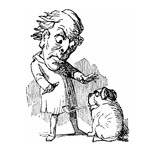
The Problem of the Pastor’s Dog
GUEST COLUMN
An owner treats his dog like family. Both live together in a bond of great intimacy and affection.
Priestly dog ownership raises a trifling but ticklish question: Should a pastor house his dog in the rectory? Moral theologian Francis J. Connell, C.SS.R., replies with an equivocal “yes and no.”
Neither divine law nor the general law of the Church forbids a priest from owning a domesticated carnivorous canine. The propriety of using the rectory as a dog house is, however, an arguable point.
Bishops rarely lay down rules regarding a priest’s in-house pets. On this topic, Canon Law is silent. Holy Writ mentions the dog over 40 times, but mostly in terms of contempt and aversion — e.g., “As a dog returns to his vomit, so a fool returns to his folly” (Prov. 26:11) and “Do not give dogs what is holy” (Mt. 7:16).
You May Also Enjoy
Atheists are sick and tired of being referred to in pejorative or negative terms.
A Bureaucracy Devouring Its Prey... Transformed by Educational Freedom... Whitewashed Hypocrisy... Faithful to the Spirit & Letter... and more
Every technological development, at least up until now, has created a new tool that can be pressed into the service (or disservice) of man.

